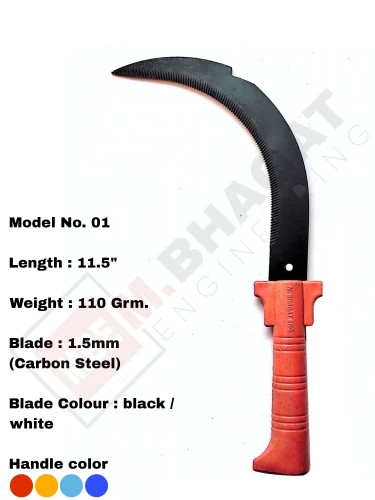Regular Plastic Hand Sickle Model No. 1
₹21.0
| Handle Material | Plastic |
| Usage/Application | Agriculture |
| Brand | MBE |
| Material | En-9 carbon steel |
| Size | 11″ |
- Description
- Additional information
- Reviews (0)
- Q & A
- Sustainability Remark
- More Offers
- Store Policies
- Inquiries
We V.V Manufacturer based in Rajkot Gujarat are Leading Manufacturer & Supplier of PVC / Plastic Agriculture Hand Sickel & Wooden Agriculture Hand Sickle and We can Supply All Over in India.
| brands | MBE |
|---|
You must be logged in to post a review.
Q & A
Harvest management tools play a significant role in improving sustainability in agriculture by enhancing efficiency, reducing waste, and optimizing resource utilization. Here are some ways in which harvest management tools contribute to sustainability:
Yield optimization: Harvest management tools help farmers determine the optimal time to harvest crops based on factors such as crop maturity, quality indicators, and weather conditions. By harvesting crops at the right time, farmers can maximize yields and minimize losses, reducing waste and maximizing resource efficiency.
Resource allocation: Harvest management tools enable farmers to allocate resources, such as labor, machinery, and storage facilities, more efficiently during the harvest season. By optimizing resource utilization, farmers can reduce energy consumption, minimize post-harvest losses, and decrease the overall environmental impact of their operations.
Waste reduction: These tools facilitate accurate yield forecasting and planning, allowing farmers to estimate their production volumes and make informed decisions about storage and distribution. By reducing overproduction and ensuring proper handling and storage, harvest management tools help minimize food waste and associated environmental impacts.
Quality control: Harvest management tools enable farmers to monitor and assess the quality of their harvested crops. By implementing quality control measures, farmers can identify and segregate crops that do not meet the desired standards, reducing waste and ensuring that only high-quality produce reaches the market.
Traceability and transparency: Harvest management tools often incorporate traceability features, allowing farmers to track the origin and journey of their crops. This promotes transparency in the supply chain and supports sustainable farming practices by enabling better compliance with regulations, reducing the risk of fraud, and improving accountability.
Data-driven decision-making: Harvest management tools collect and analyze data on various parameters, including crop yields, quality, and post-harvest losses. By leveraging this information, farmers can make data-driven decisions regarding crop selection, planting practices, and harvest methods. This leads to more efficient resource allocation, reduced environmental impact, and improved profitability.
It is worth noting that the sustainability of harvest management tools depends on factors such as their accuracy, compatibility with different crops and farming systems, accessibility for small-scale farmers, and integration with other technologies and management practices. Additionally, proper training and support for farmers in utilizing these tools effectively are crucial to maximize their sustainability benefits.
General Inquiries
There are no inquiries yet.






Reviews
There are no reviews yet.